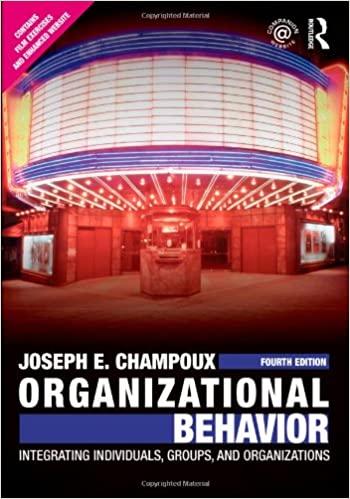Review the description of the ethical issues surrounding political behavior in organizations. Do you accept or reject
Question:
Review the description of the ethical issues surrounding political behavior in organizations. Do you accept or reject the normative positions taken from the various ethics theories? Why or why not?
INTERNATIONAL ASPECTS OF POWER AND POLITICAL BEHAVIOR IN ORGANIZATIONS
This section presents some observations on the international aspects of political behavior in organizations. Some observations are speculative because little direct assessment of political behavior in organizations across cultures has been done. Several observations come from known cultural differences that can affect how power is attributed to a person and that person’s political behavior.
People from different cultures hold different beliefs about the proper relationship between individuals who have power and those who do not. Some cultures see a directive and autocratic use of power as correct. Other cultures define a consultative or democratic approach as correct. Such cultural differences affect reactions to the use of power and related political behavior. Different individuals within those cultures, of course, can have different beliefs about power relationships.
People in the Philippines, Mexico, many South American countries, India, Singapore, and Hong Kong value a directive use of power. A manager who gives clear directions and instructions to subordinates receives more respect than a manager who consults subordinates. Workers in those countries ascribe power to a directive manager and weakness to a consultative one. Status symbols also play important roles in defining who has power and who does not. The political processes within the organizations of those countries should also mirror the power orientation of the underlying culture. Consultative-oriented managers have a distinct disadvantage when trying to maneuver through the political systems of power-directive cultures.
People in Israel, Switzerland, Austria, New Zealand, and the Scandinavian countries have an opposite orientation. Workers in those countries expect their managers to involve them in the decision-making process. A directive manager from India or Singapore, for example, would not be well accepted by workers in Scandinavian organizations. Although such a manager enjoys high power in his home culture, the same manager would have little power in Scandinavian cultures.
Cultures vary widely in their orientation to uncertainty. Some cultures value the reduction of uncertainty. Other cultures see uncertainty as a manageable part of organizational life. Workers in Greece and France expect managers to maintain low levels of uncertainty. A manager who cannot keep uncertainty low has little power and influence over his workers. Workers in Denmark and the United States, however, have a higher tolerance for uncertainty. Nonmanagers in those countries expect managers to make risky decisions. Such workers could ascribe high power to risk-taking managers and low power to those who avoid risk. The degree of power ascribed to various managers affects their ability to influence others with political tactics.
Workers in the United States, Australia, Great Britain, Canada, and the Netherlands are more individualistic than workers from many South American countries. The latter value family ties and conformity to social norms. South American workers expect managers to look after them. Managers who show genuine interest in their subordinates’ private lives enjoy higher power in South American organizations than they do in North American organizations.
Step by Step Answer:

Organizational Behavior Integrating Individuals Groups And Organizations
ISBN: 9780415804646
4th Edition
Authors: Joseph E. Champoux





